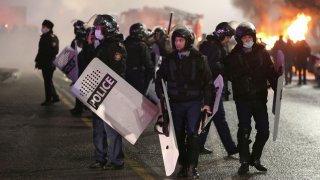
- Dozens of protesters are reported to have been killed, according to Kazakh media.
- Russian paratroopers have entered the country at the request of Kazakh President Kassym-Jomart Tokayev.
- Kazakhstan, a country of nearly 20 million people about four times the size of Texas, is one of the largest oil, gas and coal producers in the world.
Over the span of just two days, what began as protests over spiking fuel prices have snowballed into the most serious unrest the Central Asian nation of Kazakhstan, a major energy producer and long a symbol of stability among the former Soviet states, has faced in decades.
"I've never seen anything like this in Kazakhstan," Maximilian Hess, a Russian and Central Asian expert and fellow at the Foreign Policy Research Institute, told CNBC on Thursday. "It's absolutely unprecedented."
Dozens of protesters are reported to have been killed, according to Kazakh media. On Wednesday, protesters lit government buildings in the business capital of Almaty ablaze and took over Almaty airport, which was retaken by military forces by the end of the night.
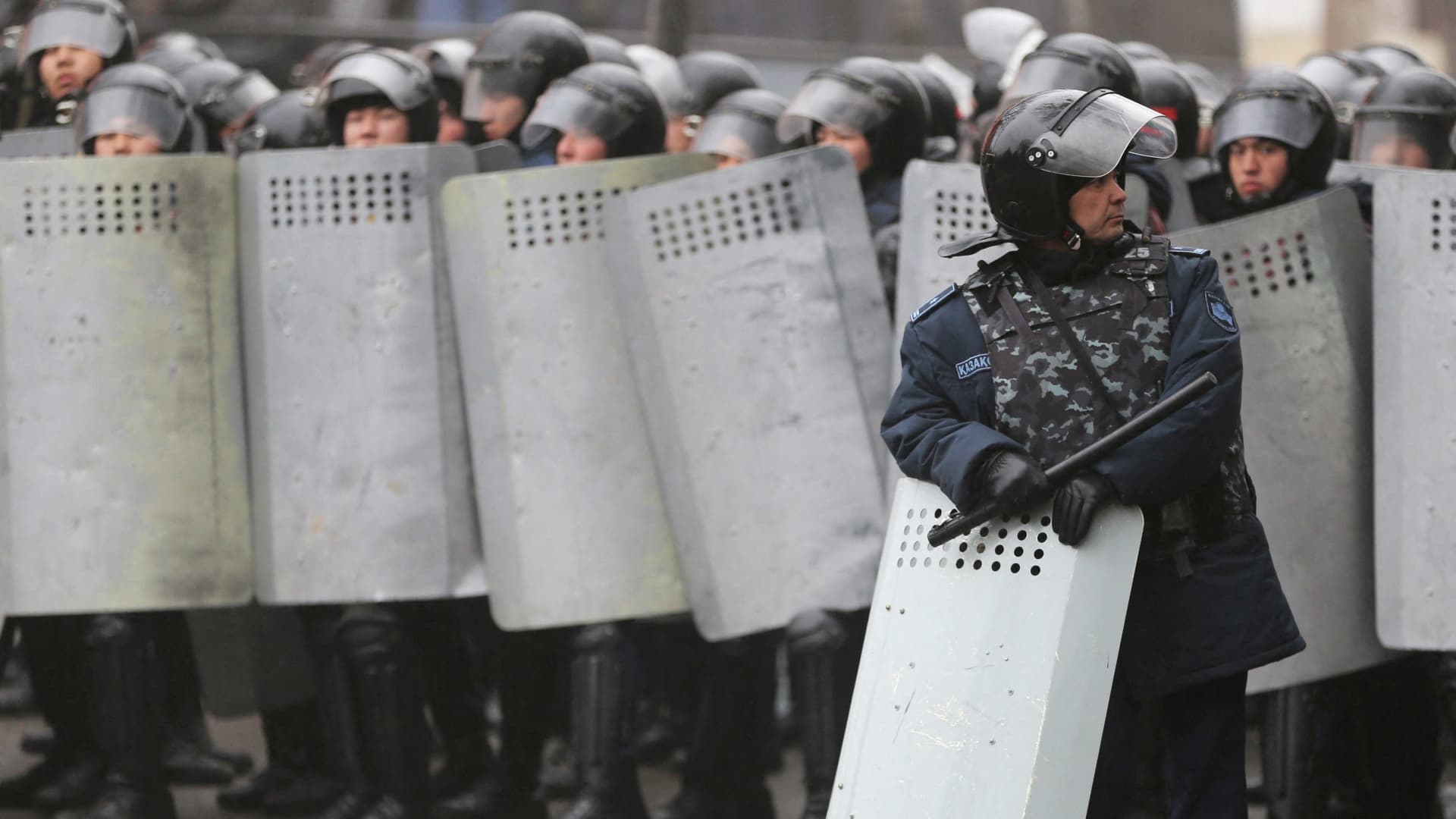
Get San Diego local news, weather forecasts, sports and lifestyle stories to your inbox. Sign up for NBC San Diego newsletters.
The internet has been suspended by the authorities, and by Wednesday evening, Kazakh President Kassym-Jomart Tokayev had requested support from Russia, which has responded by deploying forces from the Collective Security Treaty Organization, a Moscow-led military alliance of former Soviet states. Russian paratroopers have now rolled into the country, which for many brings back chilling memories of Kazakhstan's days under Soviet rule.
Videos on social media showed demonstrators facing off against hundreds of security forces in riot gear, and crowds pulling down the statue of longtime strongman and former President Nursultan Nazarbayev.
Nazarbayev, who stepped down from the presidency in 2019 but still holds significant power, was removed on Wednesday from his position as head of the country's powerful Security Council by Tokayev — his hand-picked successor. Kazakhstan's entire Cabinet has resigned, but this has not quelled the protesters.
Money Report
How did it start?
Unrest began after Kazakhstan's government announced it would lift price controls on liquefied petroleum gas, which is what the majority of Kazakhs use for their cars. Suddenly letting the market dictate LPG prices meant that most Kazakhs were paying nearly double for their gas during the new year period. The impact was particularly acute in Kazakhstan's western Mangystau province, where despite residing in a country rich in oil and gas, living standards are low. Monthly salaries average a few hundred dollars per month, and price increases in a basic amenity like gas are painful.
Kazakhstan, a country of nearly 20 million people about four times the size of Texas and the second-largest oil producer among the ex-Soviet states in the OPEC+ alliance, has always been seen as operating under an authoritarian system. Upon taking up the presidency in 2019, Tokayev pledged political and economic reforms — but critics and country analysts say that has been slow to come.
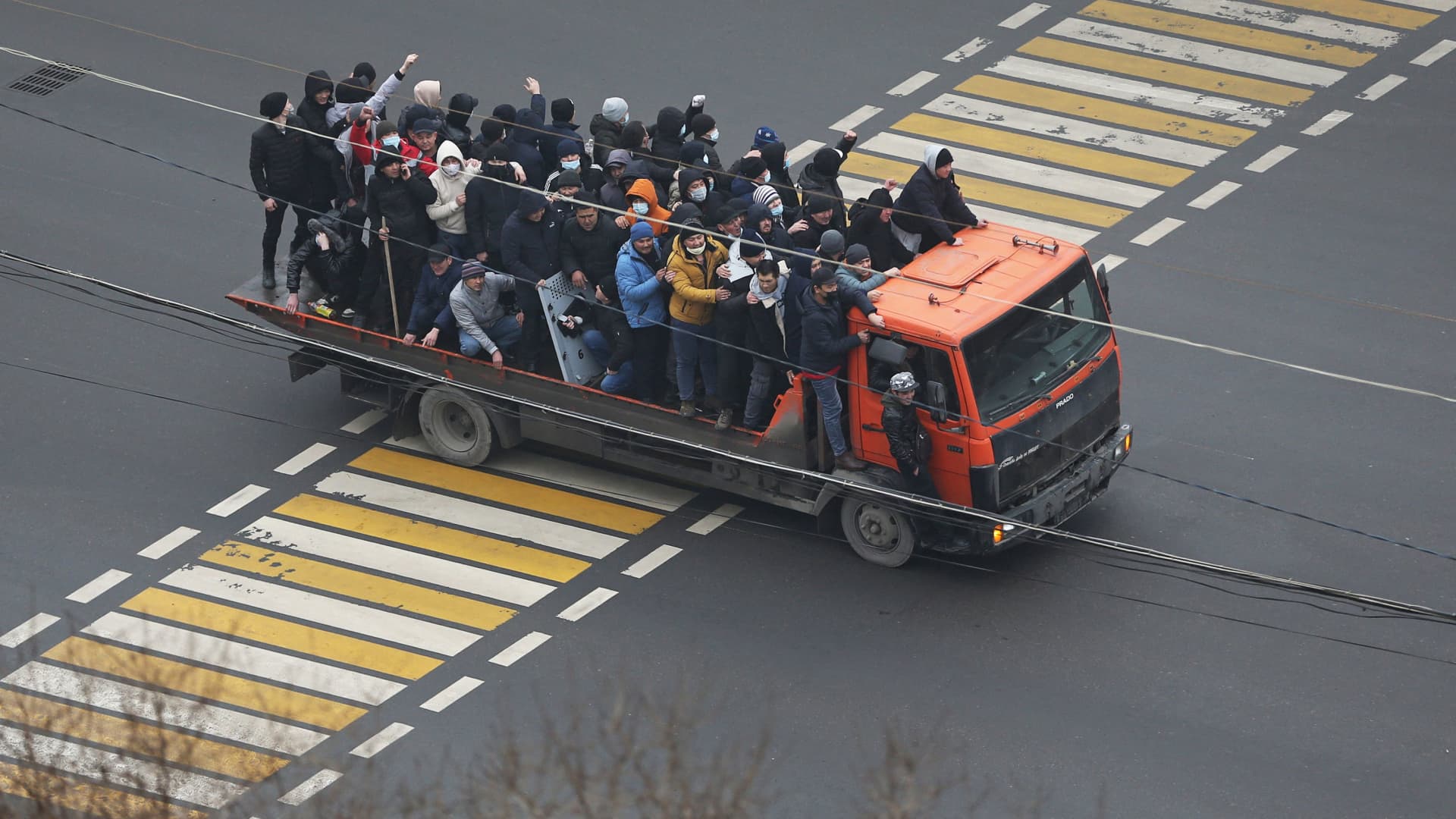
The government pulled the fuel price hikes in an attempt to appease the public. But protests sparked by anger over the lifting of the LPG price controls are now taking an increasingly political tone, with reports of demands for democratic change.
"The protesters' slogans went well beyond objecting to recent loosening of price controls for transport fuel to challenging the country's leadership," said Nick Coleman, a senior editor for oil news at S&P Global Platts who spent several years living in Kazakhstan. "In that regard the concerns are not dissimilar to those in a number of other ex-Soviet countries over the years."
Kazakh authorities are having none of it. Tokayev has already accused the protesters of being part of a foreign terrorist plot, and has pledged to be "as tough as possible" in the face of the demonstrations. Some Russian state media outlets have already accused the West of being behind the unrest.
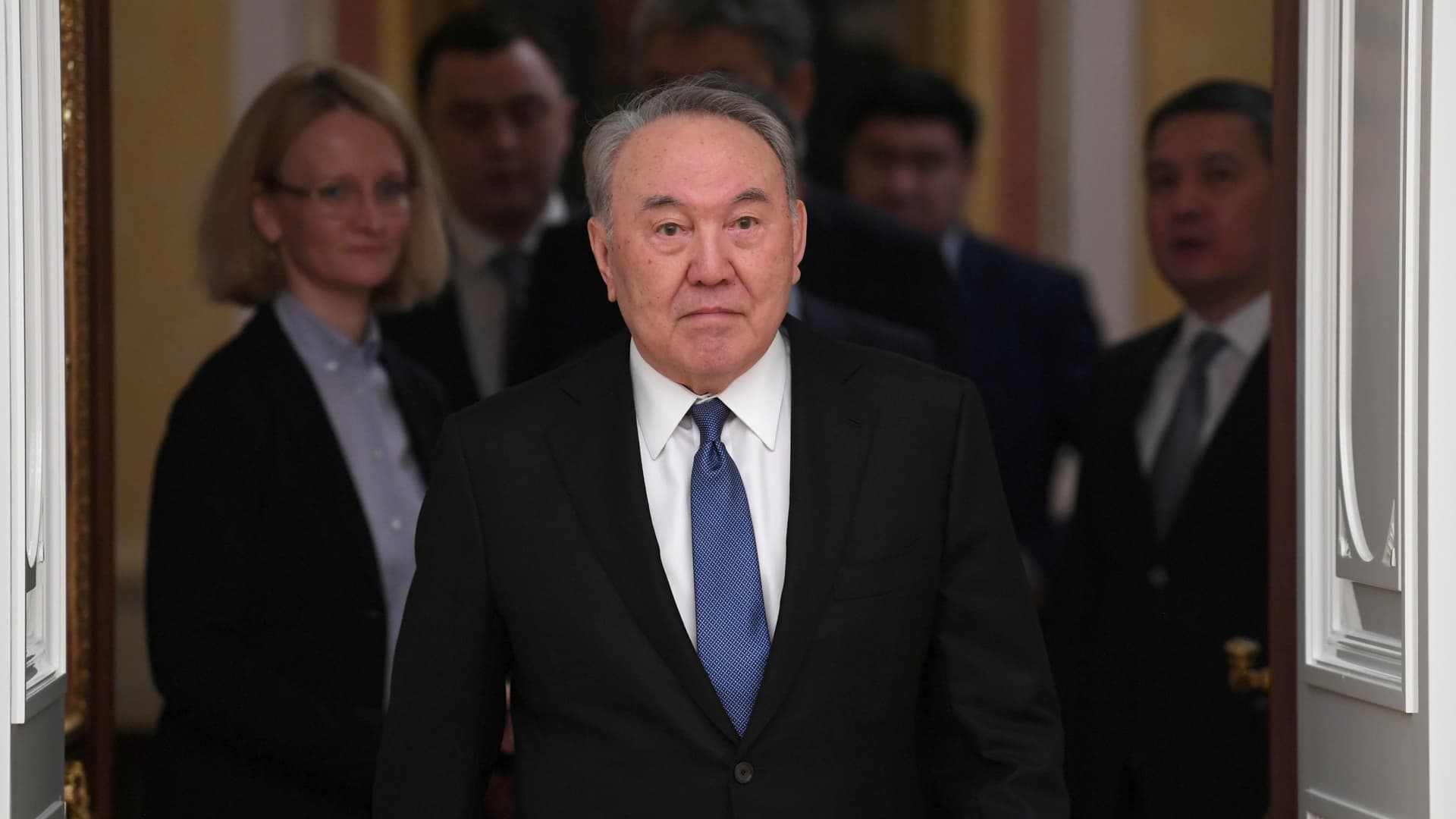
Former President Nazarbayev, a key figure, has so far been silent. A Communist Party boss during the Soviet Union, Nazarbayev rode the wave of capitalism to become independent Kazakhstan's first president from 1990 to 2019, during which time he and his family members became millionaires and billionaires.
He stepped down in 2019 to be succeeded by Tokayev, who is seen as lacking the same clout — "but the Nazarbayev family still runs the show," said Timothy Ash, senior emerging markets strategist at Bluebay Asset Management. "In Kazakhstan there is long standing unease over illiberal rule by Nazarbayev ... the population might just have had enough."
Kazakhstan: Energy and commodities giant
Kazakhstan is Central Asia's largest producer of oil and has the 12th-largest proven crude oil reserves in the world, according to the International Energy Agency. Its offshore Kashagan oil field in the Caspian Sea is the fifth-largest crude reserve in the world. In 2018, Kazakhstan was the world's ninth-largest coal producer.
Until 2015, Kazakhstan was one of the top 10 fastest-growing economies in the world, and its GDP per capita has increased sixfold since 2002, thanks to development of its oil, gas, coal and metals sectors. Major international companies including Chevron, Exxon Mobil and Shell all operate in the country, and Chevron is Kazakhstan's largest private oil producer.
Importantly, "It is one of the few OPEC+ oil producers with output set to grow in coming years," said Matt Orr, Eurasia analyst for risk intelligence firm RANE, thanks to significant investments in its lucrative Tengiz and Kashagan fields.
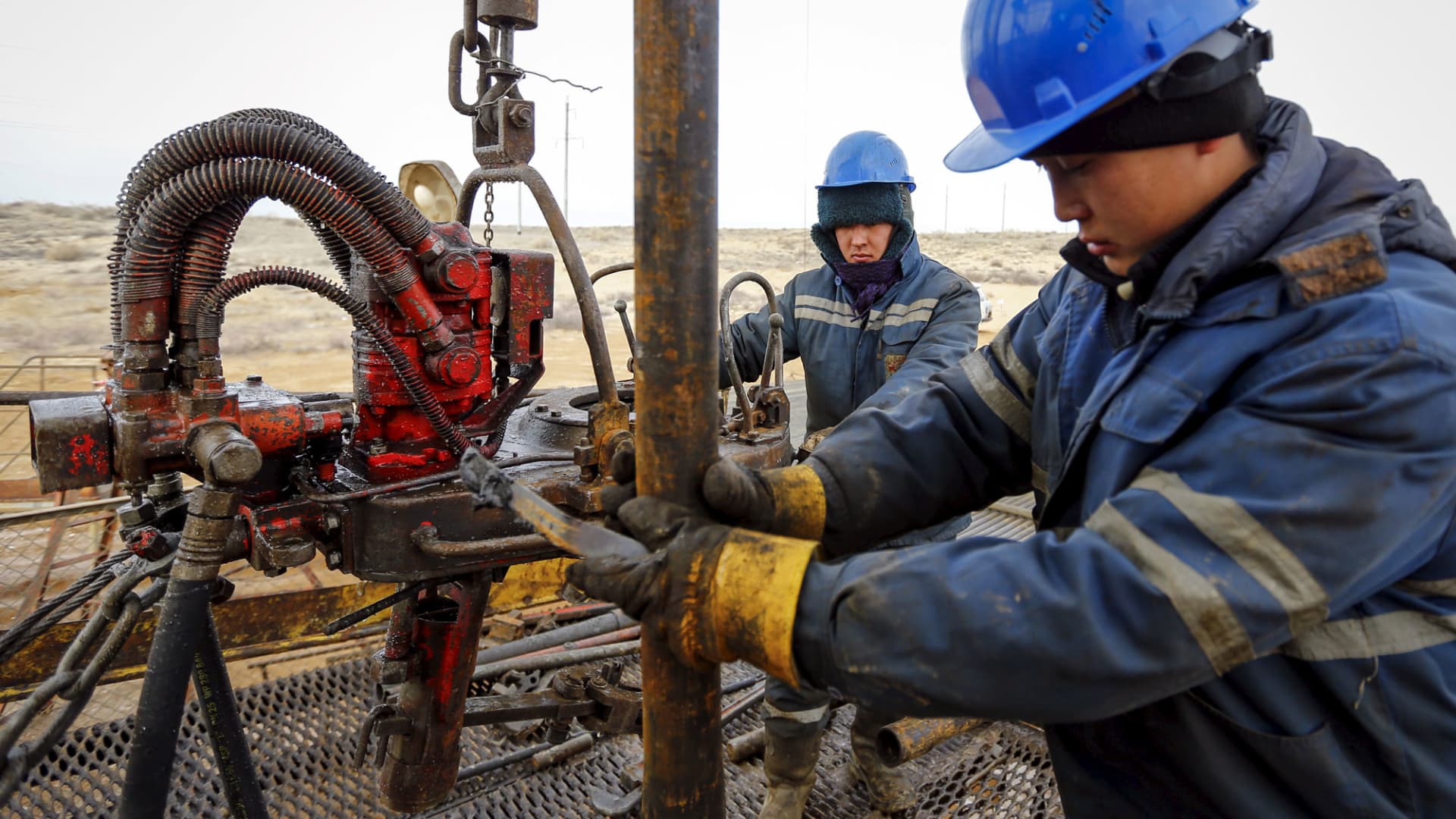
Kazakhstan is also home to some key infrastructure, including gas pipelines from Central Asia to China. But while there have been solidarity strikes at some of the oil fields, including the massive Tengiz site — one of the world's deepest operating supergiant oil fields in which Chevron has a large stake — there is so far no indication of those being disrupted, analysts say.
"In theory U.S. companies could be most affected by a hit to Kazakhstan's energy production, as they are the leading crude producers in the country," said Orr.
In 2019, U.S. oil producers accounted for roughly 30% of the oil extracted in Kazakhstan, compared with about 17% produced by Chinese companies and just 3% by Russia's Lukoil, Orr said.
While the oil workers taking part in protests or strikes "may not be essential to maintaining production, it is unclear for how long production can remain unaffected amid the possibility of more workers striking," Orr added, "particularly if the protests drag on into next week and beyond."
Russian involvement
The violence and scope of the protests — in a country favored by many investors for its predictability — has taken neighboring governments by surprise. And that likely includes Moscow, with which Kazakhstan's government has close ties.
"This is a very significant development for Putin. The violent political unrest has discredited Kazakhstan's 2019 power transition, casting doubt on the viability of a similar succession scenario being used in Russia," said Orr. He believes Russian President Vladimir Putin is now more likely to seek reelection when his current presidential term ends in 2024, "possibly seeing the start of a power transition of any kind as simply too risky given the example provided by Kazakhstan."
These events may also pull Moscow's attention away from Ukraine, along whose border Russia has amassed large numbers of troops and military hardware. Conversely, some analysts see this making the situation in Ukraine more, not less, dangerous. "Putin is likely to be smarting about developments in Kazakhstan and hence less likely to compromise over Ukraine — he will just see developments in Kazakhstan as another Western plot against him," Ash said.
A 'far reaching' crackdown?
With the internet down in much of the country, it's extremely difficult to know what exactly is happening between protesters and Russian "peacekeeping forces" on the ground, as the Kremlin terms the CSTO forces now in Kazakhstan.
"So it seems that 'order' will be restored in Kazakhstan, but only with the help of Russian/CSTO troops," Ash wrote in an email note Thursday. "The subsequent crackdown will likely be far reaching."
"While Moscow likely will have been shocked by how quickly the unrest spread and how quickly Kazakh security forces were overwhelmed, Moscow has still tried to take advantage from the crisis," Ash said, drawing a comparison with Russia's offer to help its Belarusian ally, dictator Alexander Lukashenko, in the face of popular protests in Belarus last year.
"What we are seeing as a result is Russia tighten its grip on the near abroad — Russia is weakening the sovereignty of Belarus and Kazakhstan as a result," Ash said, contending that a less-free region "sees economic stagnation, out migration and decline. Security might be tighter in the block but the long term economic outlook is weaker as a result."






